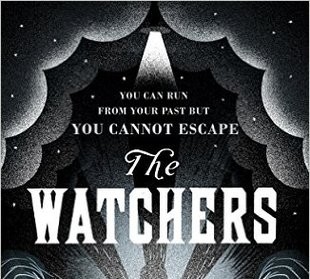Carolyn Percy reviews The Watchers, a Cold War novel set in Broad Haven, Pembrokeshire, by Welsh author Neil Spring.
Britain, 1977. The Cold War is still cold, the spectre of conflict in the form of nuclear war still looms large, and under the surface of everyday life, barely supressed paranoia simmers. In the small Pembrokeshire seaside town of Broad Haven, a slew of strange sightings have residents spooked and demanding answers: lights in the sky, faceless silver suited figures, and – witnessed by children at the local primary school – what appears to be a spaceship.
After an attack on Parliament leaves his close friend and colleague hospitalised with life threatening injuries, parliamentary researcher Robert Wildling is given the task of taking up the investigation she was carrying out: an investigation into the Broad Haven sightings. To get to the truth, Robert will have to return to a place, and a man, who Robert vowed he would never see again: Randall Llewellyn Pritchard, his grandfather; a religious lunatic spreading fear and paranoia, or something more? Over the course of his investigation, Robert will face his greatest fears, the real circumstances surrounding his parents’ tragic deaths, and what really happened one December night at his grandfather’s isolated farm in 1963.
The Watchers is Welsh born author Neil Spring’s second novel, inspired by, and loosely based on, real reported UFO sightings in the Broad Haven area in the 1970s (an area which came to be known as the Broad Haven Triangle), which a recently de-classified MOD document which reveals that military police were secretly ordered to conduct a discreet investigation into, deliberately keeping parliament, the media and the public out of the loop. Spring has used this as a springboard to create a thrilling, and genuinely chilling, story of belief and the pervasive nature of evil worthy of period Doctor Who or the late Nigel Kneale.
Everything about The Watchers reads like it’s been precision engineered – the prose is neither unsatisfyingly basic nor too distractingly flashy, instead each sentence reads as if it has been set with a spirit level, pared down but left with just the right amount of meat left on the bones. The story is told mostly from the point of view of Robert Wildling, whom we first meet two years after the events of the book – events which, as one character notes, he is evidently still haunted by – before a brief spell with him as an eleven year old boy, vulnerable after his parents’ recent death and left with his emotionally distant and rather frightening grandfather at his bleak and isolated farm, before diving into the events of the story proper.
In Robert, Neil Spring has created a deeply sympathetic main character, a man whose anxieties are in danger of controlling him, made worse by being thrust into a situation where it becomes difficult to know who to trust, and all we, the audience, want to do is protect him. The pace is also kept up nicely with the occasional interlude from a newspaper article and extracts from a book written by one of the characters – Dr Caxton, who some will recognise as the parapsychologist from Spring’s debut The Ghost Hunters (it’s not necessary to have read The Ghost Hunters for The Watchers to make sense, but this inclusion of a previous character means that the two do dovetail nicely).
For both the purposes of entertainment and exploring the nature of belief and how it can lead to behaviour that is self-destructive, Spring posits a different theory for the extra-terrestrial sightings – which I won’t spoil by saying anything further here – but which leads to an ending that, whilst it doesn’t exactly pull the rug out from underneath you, the hand is certainly poised ready to do so, and in some ways that’s even scarier.
Carolyn Percy is a regular contributor to Wales Arts Review.











